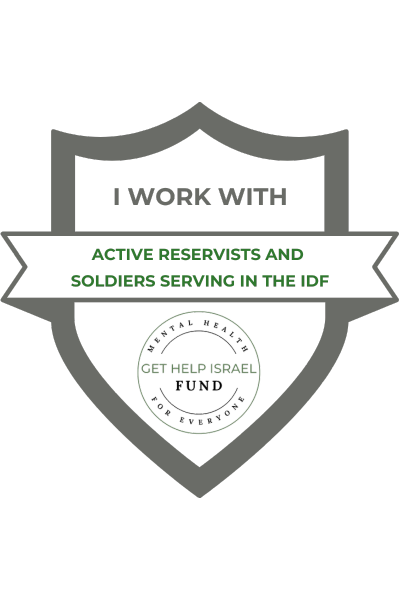Yaakov Jonathan Ugowitz
Credentials
Finances
- Pitom Haktoret 28/3
- Efrat, 90435
- Kanaei Hagalil 5
- Jerusalem
- Email Me
-
 Business HoursEvenings
Business HoursEvenings
Yaakov Jonathan Ugowitz
 Verified
Verified
Credentials
Mental Health Counselor, Psychologist
LMHC, MA, PhD
Finances
500-700 NIS
N/A
After meeting the client, I am willing to consider a fee reduction if there is a need.
- Pitom Haktoret 28/3
- Efrat, 90435
- Kanaei Hagalil 5
- Jerusalem
ABOUT THE THERAPIST
I believe that the job of a therapist is to help their client make the changes in their life that will enable them to achieve their goals, and be the person they want to be, doing the activities that are important to them. In order to do this, it is important to help the client understand what they are THINKING, FEELING, and DOING in the here and now that is interfering with them accomplishing their goals, AND help them to make effective changes in those domains to move towards their goals. To this end, in addition to traditional Cognitive-Behavioral Therapy (CBT) techniques, it is extremely important to teach the client about the neuro-biological and psychological processes that are maintaining their current state, and to learn what can be changed, and what needs to be accepted, and how to move on despite uncomfortable situations and feelings.
QUALIFICATIONS
PhD, MA, LMHC
Hofstra University
2007
Degree
PhD, MA, LMHCEducation
Hofstra UniversityYear of Graduation
2007Years in Practice
17
REGISTERED PSYCHOLOGIST IN ISRAEL
Registration in Pinkas Hapsichologim
114956
DISTANCE COUNSELING
Telephone Counseling, Online Therapy
PRIMARY SPECIALTIES
Anxiety / Panic
Depression
Obsessive Compulsive Disorder (OCD)
Phobias
Trauma / Post Traumatic Stress Disorder PTSD
ADDITIONAL SPECIALTIES
Adjustments
Anger Management
Autism Spectrum
Behavioral Concerns In Children
Borderline Personality Disorder
Executive / Career / Life Coaching
Grief
Life Transitions
Personality Disorders
Stress Management
CLIENT FOCUS
Population
Adolescents
Adults
Men
Women
Languages Spoken
Hebrew
English
TREATMENT APPROACH
Cognitive Behavioral Therapy (CBT)Cognitive Behavioral Therapy (CBT) is a type of psychotherapy that focuses on how one's thoughts, feelings and behaviors are connected and can be changed. It is based on the idea that how we think (cognition) and how we feel (emotion) can influence how we behave. CBT helps people identify and challenge distorted thinking and replace it with more balanced thinking, leading to improved mood and behavior. ‘Homework’, usually containing practical writing exercises, is often completed by the client between sessions to reinforce the therapy. Examples of tools that practitioners often use are journaling, challenging beliefs, and mindfulness.
Play TherapyPlay therapy is an evidence-based, developmentally appropriate form of intervention used to facilitate emotional, cognitive, and social growth in children. Play therapy is based on the premise that play is the child's natural medium of self-expression and can be used to assess and help a child work through difficult emotions, thoughts, and behaviors. The goal of play therapy is to help children develop the skills and abilities to navigate life stressors, and build self-esteem. During treatment, the therapist creates a comfortable, safe environment (a playroom) for the child to play with as few limits as possible. The toys in the playroom are intended to encourage the child to express his or her feelings and develop healthier behaviors. The child’s “play” with these toys serve as the child’s symbolic words, which may be difficult to express otherwise.
SERVICES OFFERED
Individual Therapy

 Verified
Verified



